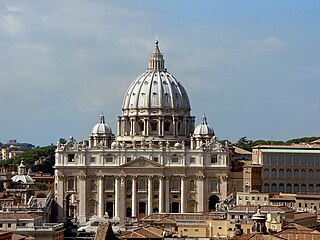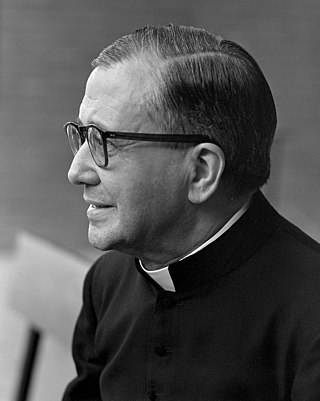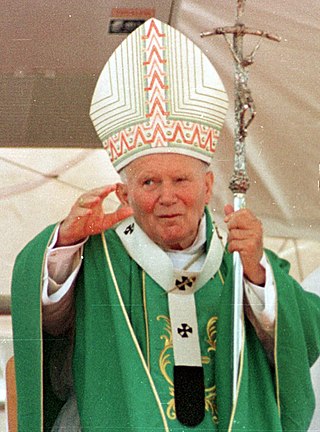The universal call to holiness is a teaching of the Roman Catholic Church that all people are called to be holy, and is based on Matthew 5:48: "Be you therefore perfect, as also your heavenly Father is perfect" (Matthew 5:48). In the first book of the Bible, the call to holiness is expressed in the Lord's words to Abraham: "Walk before me, and be blameless" (Genesis 17:1). [1]
Chapter V of the Dogmatic Constitution on the Church, Lumen gentium discusses the Universal Call to Holiness:
...all the faithful of Christ of whatever rank or status, are called to the fullness of the Christian life and to the perfection of charity; ...They must follow in His footsteps and conform themselves to His image seeking the will of the Father in all things. They must devote themselves with all their being to the glory of God and the service of their neighbor. [2]
Pope Benedict XVI spoke on the Universal Call to Holiness during his General Audience of Wednesday, 13 April 2011, saying:
"...The saints expressed in various ways the powerful and transforming presence of the Risen One. They let Jesus so totally overwhelm their life that they could say with St Paul “it is no longer I who live, but Christ who lives in me” (Gal 2:20). Following their example, seeking their intercession, entering into communion with them, “brings us closer to Christ, so our companionship with the saints joins us to Christ, from whom as from their fountain and head issue every grace and the life of the People of God itself” (cf. Second Vatican Council, Dogmatic Constitution on the Church, Lumen Gentium, n. 50).
At the end of this series of Catecheses, therefore, I would like to offer some thoughts on what holiness is. What does it mean to be holy? Who is called to be holy? We are often led to think that holiness is a goal reserved for a few elect. St Paul, instead, speaks of God’s great plan and says: “even as he (God) chose us in him [Christ] before the foundation of the world, that we should be holy and blameless before him” (Eph 1:4). And he was speaking about all of us. At the centre of the divine plan is Christ in whom God shows his Face, in accord with the favour of his will. The Mystery hidden in the centuries is revealed in its fullness in the Word made flesh. And Paul then says: “in him all the fullness of God was pleased to dwell” (Col 1:19)...
The Second Vatican Council, in the Dogmatic Constitution on the Church, speaks with clarity of the universal call to holiness, saying that no one is excluded: “The forms and tasks of life are many but holiness is one — that sanctity which is cultivated by all who act under God’s Spirit and… follow Christ, poor, humble and cross-bearing, that they may deserve to be partakers of his glory” (Lumen Gentium, n. 41)" [3]
The universal call to holiness is rooted in baptism, and the Paschal Mystery, which configures a person to Jesus Christ who is truly God and truly man, thus uniting a person with the Second Person of the Blessed Trinity, bringing him in communion with intra-trinitarian life.
Ben Sira taught about lay people that "without these cannot a city be inhabited," and "they will maintain the state of the world, and all their desire is in the work of their craft." [4]
Since 1928, St. Josemaría Escrivá, the founder of Opus Dei, also preached the universal call to holiness especially for lay people living an everyday life and doing ordinary work: "There is something holy, something divine, hidden in the most ordinary situations, and it is up to each of you to discover it." [5]
John Paul II states in his apostolic Letter Novo Millennio Ineunte , [6] his apostolic letter for the new millennium, a "program for all times", that holiness is not only a state but a task, whereby Christians should strive for a full Christian life, imitating Christ, God the Son, who gave his life for God the Father and for his neighbor. This entails a "training in the art of prayer". According to the Pope, all pastoral initiatives have to be set in relation to holiness, as this has to be the topmost priority of the Church. The universal call to holiness is explained as more fundamental than the vocational discernment to particular ways of life such as priesthood, marriage, or virginity.[ citation needed ]
At the core of the spirituality of a Catholic is this call to perfection.[ citation needed ]
Lumen gentium, the Dogmatic Constitution on the Church, is one of the principal documents of the Second Vatican Council. This dogmatic constitution was promulgated by Pope Paul VI on 21 November 1964, following approval by the assembled bishops by a vote of 2,151 to 5. As is customary with significant Roman Catholic Church documents, it is known by its incipit, "Lumen gentium", Latin for "Light of the Nations".

Apostolicam Actuositatem, also known as the "Decree on the Apostolate of the Laity", is one of the 16 magisterial documents of the Second Vatican Council.
Christus Dominus is the Second Vatican Council's "Decree on the Pastoral Office of Bishops".

Opus Dei, formally known as the Prelature of the Holy Cross and Opus Dei, is an institution of the Catholic Church, whose members seek to implement Christian ideals in their occupations and in general society.

Saint Josemaría Escrivá de Balaguer y Albás was a Spanish Roman Catholic priest. He founded Opus Dei, an organization of laypeople and priests dedicated to the teaching that everyone is called to holiness by God and to discover sanctity in their ordinary lives. He was canonized in 2002 by Pope John Paul II, who declared Josemaría should be "counted among the great witnesses of Christianity."
Novo millennio ineunte is an apostolic letter of Pope John Paul II, addressed to the Bishops Clergy and Lay Faithful, "At the Close of the Great Jubilee of 2000".

The teachings of Pope John Paul II are contained in a number of documents. It has been said that these teachings will have a long-lasting influence on the Church.
Opus Dei: A Historical Timeline shows the historical development of Opus Dei.
Opus Dei and Catholic Church Leaders discusses the comments and observations of popes, cardinals, and other leaders of the Catholic Church as regards the Personal Prelature of the Holy Cross and Opus Dei.

Teachings of Opus Dei are the teachings of the founder of Opus Dei, St. Josemaría Escrivá de Balaguer.

The Priestly Society of the Holy Cross is an association of Catholic diocesan priests which is integrally united to the Prelature of Opus Dei.
Canonization of Josemaría Escrivá de Balaguer discusses John Paul II's decision to canonize Josemaría Escrivá, founder of the Prelature of the Holy Cross and Opus Dei, more commonly known as Opus Dei.
Redemptoris missio, subtitled On the permanent validity of the Church's missionary mandate, is an encyclical by Pope John Paul II published on 7 December 1990. The release coincided with the twenty-fifth anniversary of Vatican II's Decree on the Church's Missionary Activity, Ad gentes. It is devoted to the subject of "the urgency of missionary activity" and in it the pope wished "to invite the Church to renew her missionary commitment."
Subsistit in is a Latin phrase which appears in Lumen gentium, the document on the church from the Second Vatican Council of the Catholic Church. Since the council, the reason for use of the term "subsists in" rather than simply "is" has been disputed. Generally, those who see little or no change in church teaching in Vatican II insist on the equivalence of subsistit in and "is". Those who point to a new, ecumenical thrust in Vatican II insist that the term was introduced as a compromise after much discussion, and acknowledges new elements in the council's teaching.
Catholic spirituality includes the various ways in which Catholics live out their Baptismal promise through prayer and action. The primary prayer of all Catholics is the Eucharistic liturgy in which they celebrate and share their faith together, in accord with Jesus' instruction: "Do this in memory of me." The Catholic bishops at the Second Vatican Council decreed that "devotions should be so drawn up that they harmonize with the liturgical seasons, accord with the sacred liturgy, are in some fashion derived from it, and lead the people to it, since, in fact, the liturgy by its very nature far surpasses any of them." In accord with this, many additional forms of prayer have developed over the centuries as means of animating one's personal Christian life, at times in gatherings with others. Each of the religious orders and congregations of the Catholic church, as well as lay groupings, has specifics to its own spirituality – its way of approaching God in prayer to foster its way of living out the Gospel.

Ineffabilis Deus is an apostolic constitution by Pope Pius IX. It defines the dogma of the Immaculate Conception of the Blessed Virgin Mary. The document was promulgated on December 8, 1854, the date of the annual Solemnity of the Immaculate Conception, and followed from a positive response to the encyclical Ubi primum.

Interior life is a life which seeks God in everything, a life of prayer and the practice of living in the presence of God. It connotes intimate, friendly conversation with Him, and a determined focus on internal prayer versus external actions, while these latter are transformed into means of prayer.

Vocational discernment is the process by which men and women in the Catholic Church discern, or recognize, their vocation in the church and the world. The vocations are the life of a layperson in the world, either married or single, the ordained life of bishops, priests, and deacons, and consecrated religious life.

Mediatrix is a title given to Mary, mother of Jesus in Christianity. It refers to the intercessory role of the Blessed Virgin Mary as a mediator in the salvific redemption by her son Jesus Christ and that he bestows graces through her. Mediatrix is an ancient title that has been used by many saints since at least the 5th century. Its use grew during the Middle Ages and reached its height in the writings of saints Louis de Montfort and Alphonsus Liguori in the 18th century.
Sensus fidei, also called sensus fidelium is, according to the Catechism of the Catholic Church, "the supernatural appreciation of faith on the part of the whole people, when, from the bishops to the last of the faithful, they manifest a universal consent in matters of faith and morals." Quoting the document Lumen gentium of the Second Vatican Council, the Catechism adds: "By this appreciation of the faith, aroused and sustained by the Spirit of truth, the People of God, guided by the sacred teaching authority,... receives... the faith, once for all delivered to the saints. ...The People unfailingly adheres to this faith, penetrates it more deeply with right judgment, and applies it more fully in daily life." The foundation of this can be found in Jesus' saying in Matthew 16:18 that "the gates of Hell will not prevail against it," where "it" refers to the "Church", that is, the Lord's people that carries forward the living tradition of essential beliefs throughout history, with the Bishops overseeing that this tradition does not pursue the way of error.